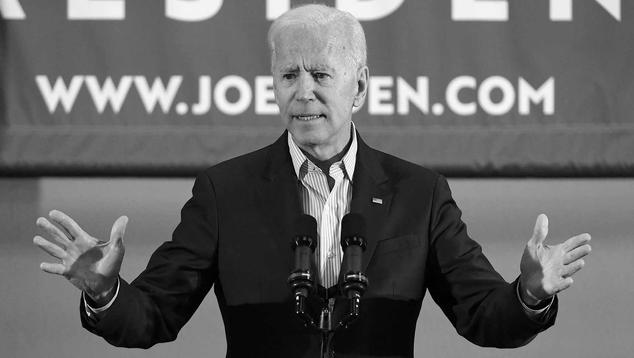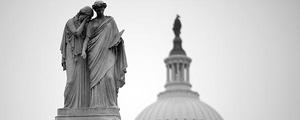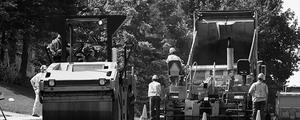Joe Biden, the current front-runner among those running for the Democratic presidential nomination, brings an unusual quality to his candidacy: 44 years of service as an elected official at the federal level. Biden was first elected to the Senate in 1972 at age 29, barely meeting the constitutional age limit by turning 30 before he was sworn into office in 1973. He served continuously as a U.S. senator and then vice president until he left office in January 2017.
Biden is 76, one year younger than 77-year-old Bernie Sanders, the oldest candidate in the race. Compared with Biden, however, Sanders is a mere youth in terms of federal experience, having served since 1991 as the sole representative of Vermont in the U.S. House and then a U.S. senator from that state.
None of the 19 other people running for the Democratic presidential nomination have anywhere near the years of federal service of Biden or Sanders. Although Sen. Elizabeth Warren, 69, is the next-oldest candidate, she has served as senator from Massachusetts only since 2013. Six of the announced candidates -- Pete Buttigieg, Julian Castro, John Hickenlooper, Wayne Messam, Marianne Williamson, and Andrew Yang -- have never held federal elective office. Williamson and Yang have never been elected to political office at any level.
Post-World War II presidents Gerald Ford, Richard Nixon and Lyndon Johnson were D.C. veterans when they become president, but none of these had Biden's tenure. Ford and Johnson come closest. Ford had served in the House for 26 years and briefly as vice president before becoming president in 1974; and Johnson had served 26 years as House member, senator and vice president before assuming the presidency in 1963. Nixon had served for 14 years as a House member, senator and vice president before his election in 1968.
Doing the math, we can see that to match Biden's experience, a president would have to be at least 69 years old when inaugurated to have acquired 44 years of federal service. That's because the youngest age at which a person could begin acquiring federal experience as an elected official is 25, the Constitution's minimum age for a member of the House of Representatives. Add 44 years to that, and we get 69 years of age. But only two presidents have been that old when first elected -- Ronald Reagan and Donald Trump -- and neither had any prior experience as an elected official at the federal level. So Biden, if elected, would clearly set the record as the person with the most federal experience (before being elected) of any president in U.S. history.
What are the implications of Biden's extraordinary experience for his presidential campaign? Can Biden thread the needle between positioning his vast governmental experience as a plus on the one hand, while minimizing the negative connotations of his insider status on the other?
The operative data point in answering that question is the negative light in which Americans today view the federal government. Americans currently put government at the top of the nation's "most important problem" list, and those heavily involved in government can certainly be tainted by association.
As I've discussed elsewhere, Democratic candidates are in a paradoxical position when it comes to the federal government. Most of these candidates are calling for the government to take on increased responsibilities for solving the nation's problems in areas like healthcare, inequality, injustice based on race, sex, sexual orientation and so forth. But this "government as fixer of all evils" approach runs up against the evidence that many Americans see the government as the source of the problems, as well as potentially part of the solutions.
Some candidates are handling this by borrowing from Trump's 2016 "drain the swamp" campaign and criticizing the federal government (even while extolling its virtues as the vehicle for new policy proposals). Candidate Pete Buttigieg, as an example, has no federal experience and is attempting to make that outsider status into a plus: "I would stack up my experience against anybody. I know it's not as traditional, I know I haven't been marinating in Washington here for a very long time and I'm not part of the same establishment."
Elizabeth Warren, a relative newcomer to the Senate, has taken on the federal government by calling for an end to "corruption" in Washington and advocating new laws eliminating the revolving door between government and private-sector service. Bernie Sanders (despite his own 28 years as part of the D.C. establishment) says, "We must take back our democracy for the American people."
This type of approach is more difficult for Biden. He has unique and unparalleled experience as part of the federal government system in Washington, but that also means he has been a lifelong member of the establishment that many are running against. The question for Biden's campaign is what to do about it.
Biden could argue that he will use his experience and understanding of how things work in Washington to get the system moving in the right direction, avoid dreaded government shutdowns and smooth out government operations. This approach fits with the public's demonstrable desire for more compromise from their officials and, if done correctly, could square with the public's expectation that their government maintain infrastructure, keep the country defended, provide Social Security and Medicare, and do many other necessary tasks. But it risks highlighting the downside of Biden's being a lifelong part of what many perceive as a dysfunctional system.
Biden could also argue that he would be in a good position to root out corruption, using his insider knowledge to figure out just where and how to fix government. This approach, however, runs up against the fact that Biden doesn't have a strong track record of attacking these problems during his previous 44 years in D.C., casting some doubt on his commitment to doing so if the voters send him back there.
Biden could downplay his previous government service and attempt to keep the focus on Trump and the need for new policy initiatives. But this is what all other Democratic candidates are doing and would mean ignoring one of Biden's key distinguishing characteristics. Plus, Biden's Democratic opponents (and Trump, should Biden win his party's nomination) are going to take advantage of Biden's long track record by highlighting the missteps and mistakes he has made along the way (44 years of service leave a long track record). This makes it difficult for Biden to ignore his previous service even if he wants to.
Biden's presidential campaign has other challenges, of course, including his age and how he ends up positioning himself vis-à-vis his competitors along the moderate-to-progressive ideological spectrum. But his 4 ½ decades of service as U.S. senator and vice president clearly distinguish him from the other 20 candidates in the race for the Democratic presidential nomination, and how he deals with that experience will by necessity need to be a significant part of his campaign.




